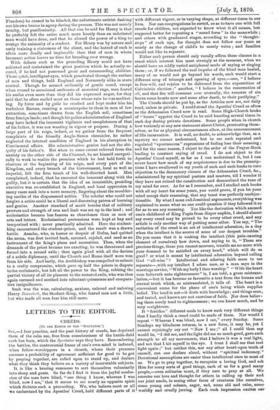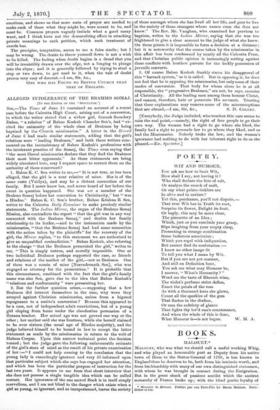LETTERS TO THE EDITOR.
CREEDS.
[TO MR EDITOR OF TER " SPECTATOR:]
Sin,—I fear practice, and the past history of creeds, has deprived them of the calm use, free from consciousness of the battle-field each has been, which the Spectator says they have. Remembering the battles, the controversial frame of one's own mind is induced, when fellow-worshippers in a church, where their presence assumes a probability of agreement sufficient for good to be got by praying together, are called upon to stand up, and declare what they think they believe on a variety of inscrutable subjects.
It is like a bracing summons to sort themselves voluntarily into sheep and goats. So far do I find it from the joyful confes- sion of the man born blind, "one thing I know, whereas I was blind, now I see," that it seems to me nearly an opposite spirit which dictates such a proceeding. We, who believe most or all we understand by the Apostles' Creed, hold different parts of it
with different vigour, or in varying shape, at different times in our lives. Nor can congregations be sorted, so as to have one with full creeds for children, not expected to know what it all means, but supposed better for repeating a "sound form" in the meanwhile ; and others with graduated stages, according to the " thought- steps " of each age, for thought does not follow our years as nearly as the change of child's to manly voice ; and families would not like to separate.
Either each person should only vocally affirm those clauses in a creed which interest him most strongly at the moment, when we should have an oddly varied antiphonal mode of saying or singing them ; or, if we followed the real impulse of the blind man healed, many of us would not go beyond his words, each would start a different song of triumph and opening of eyes,—one, "I believe in free-will, and rejoice to be delivered from the superstition of Calvinistic election ;" another, "I believe in the resurrection of all, and that fire will consume none eternally, the remorse of sin burns some hearts now and some after death, to their purifying."
The Creeds should be put by, as the Articles now are, not daily read, unless in private. I could stand the Apostles' Creed as often as the Athanasian Creed now is read. Some High-Church books of " hours " appoint the Creed to be said kneeling several times in each day during private devotions. Some people when in church bow variously at any new statement about Christ, prostrating them- selves, as far as physical circumstances allow, at the announcement of His incarnation. It is well, no doubt, to acknowledge that, as a mystery we cannot understand, but to me such repeated and regulated "spontaneous" expressions of feeling lose their meaning ; and for the same reason, I object to the order of the Prayer-Book leading to constant saying of creed. I do not object to the Apostles' Creed myself, as far as I can understand it, but I can never know how much of my acquiescence is due to the prescrip- tions I have swallowed in my youth of such and such books to cure- objection to the damnatory clauses of the Athanasian Creed, &c.„ administered by my spiritual pastors and masters, till I wonder if they have not ruined the constitution and demoralized the tone of my mind for ever. As far as I remember, and I studied such books. with all my heart for some years, you could prove, if you let your mind accept their reasoning, that any tenet was perfectly unobjec- tionable. By what I must callJesuitical arguments, everything was explained to mean what no one could question if they followed it so far as to see any meaning. Too like the derivation which amused one's childhood of King Pepin from diaper napkin, I should almost say every creed may be proved to be every other creed, and any article is only another way of putting some other. You say, "The recitation of the creed is an act of intellectual adoration, in a day when the intellect is the source of some of our deepest troubles." Do you mean that it is making the intellect (this pain-causing element of ourselves) bow down, and saying to it, "These are precious things, these you cannot measure, trouble me no more with your demand to be satisfied on every head," which will do us good ? or what is meant by intellectual adoration beyond calling God " all-wise " ? Intellectual and adoring faith seem to me separate—,with my intellect I adore men, as a man says in the marriage service, "With mybody I thee worship." "With the heart man believeth unto righteousness" is, I am told, a gross mistrans- lation,—but it has become so favourite a text from the human and eternal truth which, so mistranslated, it tells of. The heart is a convenient name for the phase of one's being which supplies belief. The head is not—it deals with knowledge; and things seen, and tasted, and known are not exercises of faith. Nor does believ- ing them surely tend to righteousness ; we can know much, and be very unrighteous.
It "fortifies" different souls to know such very different things that I hardly think a creed could be made of them. Nor would I repeat "Whereas I was blind, now I see," every Sunday. Some Sundays my blindness returns, in a new form, it may be, yet I cannot rejoicingly cry out "Now I see ;" all I could then say would be, "I did see, and the light did me so much good, gave such strength to all my movements, that I believe it was a real light, and not that I hit myself in the eye. I trust I shall see that real light again ;" but neither this, nor any other heart-open truth of oneself, can one declare aloud, without "spiritual indecency.' Devotional assumptions are easier than intellectual ones to most of us. We go to pray together, to recognize a loving God, and ask Him for many sorts of good things, each of us for a good many people,—even solitaries must, if they care to pray at all. We exercise our love and thought for others in calling up their and our joint needs, in seeing other faces of creatures like ourselves,. some young and solemn, eager, sad, some old and calm, some. worldly and cruelly jarring. Each such impression excites or
emotions, and shows us that more sorts of prayer are needed to make each of these what they might be, were meant to be, an( must be. Common prayers vaguely include what a good many want, and I think have not the demoralizing effect in attaching private meanings to each petition, which such treatment of creeds has.
The precipice, temptation, seems to me a false simile ; but I may be wrong. The desire to throw yourself down is not a wish to be killed. The feeling when doubt begins is a dread that you will be irresistibly drawn over the edge, not a longing to plunge into the abyss ; and it is generally followed by trying to steal a step or two down, to get used to it, when the vale of doubt proves very easy of descent.—I am, Sir, &c., ONE WHO HAS FOUND NO BETTER CHURCH THAN THAT OF ENGLAND.































 Previous page
Previous page